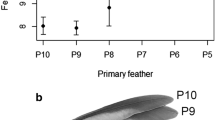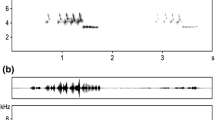Abstract
Animals have evolved a variety of mechanisms to detect and avoid predation. The non-vocal sounds produced by some bird species during takeoff flights have been considered to function as an alarm call, because they may convey information about predation risk. Here, we experimentally investigated the effects of the non-vocal sound (wing trills) produced by the scaled dove (Columbina squammata) on antipredation behaviours of conspecifics. We evaluated the individual response to playbacks of the wing trill stimulus and compared it to the response to other two control stimuli (vocalizations of the scaled dove and the southern house wren). We found that doves’ probability to become vigilant or to display freezing behaviour was higher after a wing trills stimulus in comparison to the other playback stimuli. These results suggest that wing trill production in scaled doves communicate potential risks and are considered by the individuals in the decision-making process, but we cannot rule out the possibility that any takeoff flight sound might also promote antipredator responses.




Similar content being viewed by others
Data availability
Data available on request from the authors.
References
Abbey-Lee RN, Kaiser A, Mouchet A, Dingemanse NJ (2016) Immediate and carry-over effects of perceived predation risk on communication behavior in wild birds. Behav Ecol 27:708–716. https://doi.org/10.1093/beheco/arv210
Amorim PS, Dias RI (2019) Non-vocal communication as an anti-predator strategy in scaled doves (Columbina squammata). J Ethol 37:157–165. https://doi.org/10.1007/s10164-018-0583-7
Ballarini Y, Frizzas MR, Marini MA (2013) Stomach contents of Brazilian non-passerine birds. Rev Bras Ornitol 21:235–242
Barrera JP, Chong L, Judy KN, Blumstein DT (2011) Reliability of public information: predators provide more information about risk than conspecifics. Anim Behav 81:779–787. https://doi.org/10.1016/j.anbehav.2011.01.010
Bates D, Maechler M, Bolker B, Walker S (2015) Fitting Linear Mixed-Effects Models Using lme4. J Stat Softw 67:1–48. https://doi.org/10.18637/jss.v067.i01
Beauchamp G (2019) On how risk and group size interact to influence vigilance. Biol Rev 94:1918–1934. https://doi.org/10.1111/brv.12540
Binazzi R, Zaccaroni M, Nespoli A, Massolo A, Dessí-Fulgheri F (2011) Anti-predator behaviour of the red-legged partridge Alectoris rufa (Galliformes: Phasianidae) to simulated terrestrial and aerial predators. Ital J Zool 78:106–112. https://doi.org/10.1080/11250003.2010.509136
Bostwick KS (2006) Mechanisms of feather sonation in Aves: unanticipated levels of diversity. Acta Zool Sin 52:68–71
Bostwick KS, Prum R (2003) High-speed video analysis of wing-snapping in two manakin clades (Pipridae: Aves). J Exp Biol 206:3693–3706. https://doi.org/10.1242/jeb.00598
Bradbury JW, Vehrencamp SL (2011) Principles of animal communication. Sinauer, Sunderland
Brown GE, Smith RJF (1997) Conspecific skin extracts elicit antipredator responses in juvenile rainbow trout (Oncorhynchus mykiss). Can J Zool 75:1916–1922. https://doi.org/10.1139/z97-821
Brown JS, Kotler BP (2004) Hazardous duty pay and the foraging cost of predation. Ecol Lett 7:999–1014. https://doi.org/10.1111/j.1461-0248.2004.00661.x
Caro TM (2005) Antipredator defenses in birds and mammals. University of Chicago Press, Chicago
Charalabidis A, Dechaume-Moncharmont FX, Petit S, Bohan DA (2017) Risk of predation makes foragers less choosy about their food. PLoS ONE 12:e0187167. https://doi.org/10.1371/journal.pone.0187167
Clark CJ (2016) Locomotion-induced sounds and sonations: mechanisms, communication function, and relationship with behavior. In: Suthers RA, Fitch, WT, Fay RR, Popper AN, (ed), Vertebrate Sound Production and Acoustic Communication. Springer Handbook of Auditory Research, Cham vol 53. pp 83–117
Clark CJ, Feo TJ (2010) Why do calypte hummingbirds “sing” with both their tail and their syrinx? An apparent example of sexual sensory bias. Am Nat 175:27–37. https://doi.org/10.1086/648560
Cocroft RB, Rodríguez RL (2005) The behavioral ecology of insect vibrational communication. Biosci 55:323–334. https://doi.org/10.1641/0006-3568(2005)055[0323:tbeoiv]2.0.co;2
Cooper WE (2000) Tradeoffs between predation risk and feeding in a lizard, the broad-headed skink (Eumeces laticeps). Behav 137:1175–1189. https://doi.org/10.2307/4535766
Coleman SW (2008) Mourning dove (Zenaida macroura) wing-whistles may contain threat-related information for con- and hetero-specifics. Naturwissenschaften 95:981–986. https://doi.org/10.1007/s00114-008-0404-x
Creel S, Schuette P, Christianson D (2014) Effects of predation risk on group size, vigilance, and foraging behavior in an African ungulate community. Behav Ecol 25:773–784. https://doi.org/10.1093/beheco/aru050
Cristaldo PF, Jandák V, Kutalová K, Rodrigues VB, Brothánek M, Jiřıć̌ek O, DeSouza O, Šobotnıḱ J (2015) The nature of alarm communication in Constrictotermes cyphergaster (Blattodea: Termitoidea: Termitidae): the integration of chemical and vibroacoustic signals. Biol Open 4:1649–1659. https://doi.org/10.1242/bio.014084
Cunha FCR, Fontenelle JCR, Griesser M (2017) Predation risk drives the expression of mobbing across bird species. Behav Ecol 28:1517–1523. https://doi.org/10.1093/beheco/arx111
Dall SR, Giraldeau LA, Olsson O, McNamara JM, Stephens DW (2005) Information and its use by animals in evolutionary ecology. Trends Ecol Evol 20:187–193. https://doi.org/10.1016/j.tree.2005.01.010
Danchin E, Giraldeau LA, Valone TJ, Wagner RH (2004) Public information: from nosy neighbors to cultural evolution. Science 305:487–491. https://doi.org/10.1126/science.1098254
Dias RI (2006) Effects of position and flock size on vigilance and foraging behaviour of the scaled dove Columbina squammata. Behav Process 73:248–252. https://doi.org/10.1016/j.beproc.2006.06.002
Elgar MA (1989) Predator vigilance and group size in mammals and birds: a critical review of the empirical evidence. Biol Rev 64:13–33. https://doi.org/10.1111/j.1469-185x.1989.tb00636.x
Elias DO, Hebets EA, Hoy RR, Mason AC (2005) Seismic signals are crucial for male mating success in a visual specialist jumping spider (Araneae: Salticidae). Anim Behav 69:931–938. https://doi.org/10.1016/j.anbehav.2004.06.024
Foster WA, Treherne JE (1981) Evidence for the dilution effect in the selfish herd from fish predation on a marine insect. Nature 293:466–467. https://doi.org/10.1038/293466a0
Freeberg TM, Book DL, Jung H, Kyle SC (2017) Communication, Cues, and Signals. In: Shackelford T, Weekes-Shackelford V, (ed), Encyclopedia of Evolutionary Psychological Science. Springer, Cham. p. 1–10. https://doi.org/10.1007/978-3-319-16999-6_2728-1
Friedmann H, Smith FD (1950) A contribution to the ornithology of northeastern Venezuela. Proc U S Nat Mus 100:411–538
Hartig F (2020) DHARMa: residual diagnostics for hierarchical (multi-level/mixed) regression models. R package version 0.3.2.0. https://CRAN.R-project.org/package=DHARMa
Hingee M, Magrath RD (2009) Flights of fear: a mechanical wing whistle sounds the alarm in a flocking bird. Proc R Soc B 276:4173–4179. https://doi.org/10.1098/rspb.2009.1110
Hollén LI, Bell MBV, Radford AN (2008) Cooperative sentinel calling? Foragers gain increased biomass intake. Curr Biol 18:576–579. https://doi.org/10.1016/j.cub.2008.02.078
Hrouzková E, Dvořáková V, Jedlička P, Šumbera R (2013) Seismic communication in demon African mole rat Tachyoryctes daemon from Tanzania. J Ethol 31:255–259. https://doi.org/10.1007/s10164-013-0374-0
Johnston RF (1960) Behavior of the Inca Dove. The Condor 62:7–24. https://doi.org/10.2307/1365655
Kotrschal A, Deacon AE, Magurran AE, Kolm N (2017) Predation pressure shapes brain anatomy in the wild. Evol Ecol 31:619–633. https://doi.org/10.1007/s10682-017-9901-8
Krause J, Godin JGJ (1995) Predator preferences for attacking particular prey group sizes: consequences for predator hunting success and prey predation risk. Anim Behav 50:465–473. https://doi.org/10.1006/anbe.1995.0260
Lagos PA, Meier A, Tolhuysen LO, Castro RA, Bozinovic F, Ebensperger LA (2009) Flight initiation distance is differentially sensitive to the costs of staying and leaving food patches in a small-mammal prey. Can J Zool 87:1016–1023. https://doi.org/10.1139/z09-089
Leavesley AJ, Magrath RD (2005) Communicating about danger: urgency alarm calling in a bird. Anim Behav 70:365–373. https://doi.org/10.1016/j.anbehav.2004.10.017
Lehtonen J, Jaatinen K (2016) Safety in numbers: the dilution effect and other drivers of group life in the face of danger. Behav Ecol Sociobiol 70:449–458. https://doi.org/10.1007/s00265-016-2075-5
Lima SL (1995) Collective detection of predatory attack by social foragers: fraught with ambiguity? Anim Behav 50:1097–1108. https://doi.org/10.1016/0003-3472(95)80109-x
Lima SL, Dill LM (1990) Behavioral decisions made under the risk of predation: a review and prospectus. Can J Zool 68:619–640. https://doi.org/10.1139/z90-092
Macleod R, Gosler AG, Cresswell W (2005) Diurnal mass gain strategies and perceived predation risk in the great tit Parus major. J Anim Ecol 74:956–964. https://doi.org/10.1111/j.1365-2656.2005.00993.x
Miranda JP, Costa JCL, Scarpa FM, Rocha CFD (2013) Predation on Columbina squammata (Aves: Columbidae) by the Green Vine Snake Oxybelis fulgidus (Serpentes: Colubridae) at the Lençóis Maranhenses National Park, Maranhão, Brazil. Herpetol Notes 6:187–188
Murray TG, Zeil J, Magrath RD (2017) Sounds of modified flight feathers reliably signal danger in a pigeon. Curr Biol 27:3520-3525.e4. https://doi.org/10.1016/j.cub.2017.09.068
Niese RL (2010) Non-vocal sounds produced by the wings of Inca doves, Columbina inca, and seasonal effects on communication behavior in Costa Rican dry-moist lowland forest. http://digital.lib.usf.edu/SFS0001474/00001
Niese RL (2019) Why the weird wings? Investigating the morphology, function, and evolution of unusual feathers in pigeons and doves (Columbidae). Doctoral dissertation, University of Montana.
Niese RL, Clark CJ, Tobalske BW (2020) Specialized feathers produce sonations during flight in Columbina ground doves. Integr Comp Biol icaa051 https://doi.org/10.1093/icb/icaa051
Niese RL, Tobalske BW (2016) Specialized primary feathers produce tonal sounds during flight in rock pigeons (Columba livia). J Exp Biol 219:2173–2181. https://doi.org/10.1242/jeb.131649
Powell MJD (2009) The BOBYQA algorithm for bound constrained optimization without derivatives, Report No. DAMTP 2009/NA06, Centre for Mathematical Sciences, University of Cambridge, UK. http://www.damtp.cam.ac.uk/user/na/NA_papers/NA2009_06.pdf
Pruetz JD, Fulton SJ, Marchant LF, McGrew WC, Schiel M, Waller M (2008) Arboreal nesting as anti-predator adaptation by savanna chimpanzees (Pan troglodytes verus) in southeastern Senegal. Am J Primatol 70:393–401. https://doi.org/10.1002/ajp.20508
Pulliam HR (1973) On the advantages of flocking. J Theor Biol 38:419–422. https://doi.org/10.1016/0022-5193(73)90184-7
R Core Team (2020) R: A language and environment for statistical computing. Vienna, Austria: R Foundation for Statistical Computing. Retrieved from: http://www.rproject.org/
Randall JA (1994) Discrimination of footdrumming signatures by kangaroo rats, Dipodomys spectabilis. Anim Behav 47:45–54. https://doi.org/10.1006/anbe.1994.1006
Randall JA (2001) Evolution and function of drumming as communication in mammals. Am Zool 41:1143–1156. https://doi.org/10.1093/icb/41.5.1143
Randall JA, Matocq MD (1997) Why do kangaroo rats (Dipodomys spectabilis) footdrum at snakes? Behav Ecol 8:404–413. https://doi.org/10.1093/beheco/8.4.404
Reznick D (1982) The impact of predation on life-history evolution in trinidadian guppies—genetic-basis of observed life-history patterns. Evolution 36:1236–1250. https://doi.org/10.1111/j.1558-5646.1982.tb05493.x
Roth TC, Lima SL, Vetter WE (2006) Determinants of predation risk in small wintering birds: the hawk’s perspective. Behav Ecol Sociobiol 60:195–204. www.jstor.org/stable/25063803
Sick H (1997) Ornitologia Brasileira. Nova Fronteira, Rio de Janeiro
Sirot E (2006) Social information, antipredatory vigilance and flight in bird flocks. Anim Behav 72:373–382. https://doi.org/10.1016/j.anbehav.2005.10.028
Smythe N (1970) On the existence of ‘pursuit invitation’ signals in mammals. Am Nat 104:491–494
Tan K, Wang Z, Li H, Yang S, Hu Z, Kastberger G, Oldroyd BP (2012) An “I see you” prey–predator signal between the Asian honeybee, Apis cerana, and the hornet, Vespa velutina. Anim Behav 83:879–882. https://doi.org/10.1016/j.anbehav.2011.12.031
Uster D, Zuberbühler K (2001) The functional significance of Diana monkey “clear” calls. Behaviour 138:741–756. https://doi.org/10.1163/156853901752233389
WikiAves (2020) WikiAves, a Enciclopédia das Aves do Brasil. Fogo-apagou. Disponível em: http://www.wikiaves.com.br/wiki/fogo-apagou. Accessed 13 December 2019
Ydenberg RC, Dill LM (1986) The Economics of Fleeing from Predators. Adv Study Behav 16:229–249. https://doi.org/10.1016/s0065-3454(08)60192-8
Young BA, Morain M (2002) The use of ground-borne vibrations for prey localization in the Saharan sand vipers (Cerastes). J Exp Biol 205:661–665
Zanette LY, White AF, Allen MC, Clinchy M (2011) Perceived predation risk reduces the number of offspring songbirds produce per year. Science 334:1398–1401. https://doi.org/10.1126/science.1210908
Zuberbühler K (2009) Survivor signals: the biology and psychology of animal alarm calling. Adv Study Behav 40:277–322. https://doi.org/10.1016/s0065-3454(09)40008-1
Acknowledgements
We thank the Centro Universitário de Brasília (CEUB) and the Institutional Scientific Initiation Scholarship Program (PIC) for the logistic support for this study.
Funding
This work was supported by the Centro Universitário de Brasília (UniCEUB) and the Institutional Scientific Initiation Scholarship Program (PIC).
Author information
Authors and Affiliations
Corresponding author
Ethics declarations
Ethics approval
All applicable international, national and/or institutional guidelines for the care and use of animals were followed. All procedures performed in studies involving animals were in accordance with the ethical standards of the institution or practice at which the studies were conducted. The study complied with the current laws of Brazil under permit 50793 from Instituto Brasileiro de Recursos Renováveis (IBAMA).
Conflict of interest
The authors declare no competing interests.
Additional information
Publisher's Note
Springer Nature remains neutral with regard to jurisdictional claims in published maps and institutional affiliations.
Supplementary Information
Below is the link to the electronic supplementary material.
Supplementary file1 (MOV 8437 KB)
Supplementary file2 (MOV 7232 KB)
Rights and permissions
About this article
Cite this article
Amorim, P.S., Dias, R.I. A non-vocal alarm? Effects of wing trill playbacks on antipredator responses in the scaled dove. acta ethol 24, 119–126 (2021). https://doi.org/10.1007/s10211-021-00368-9
Received:
Revised:
Accepted:
Published:
Issue Date:
DOI: https://doi.org/10.1007/s10211-021-00368-9




